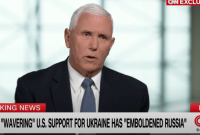The Brief
- The Catholic conclave is currently taking place but hasn’t chosen a new pope as of now.
- The voting will continue for as long as 13 days.
- Smoke from the Vatican chimney alerts the world to the voting results. The smoke colors are produced using specific chemical mixtures.
HOUSTON
–
The Catholic conclave is underway and has not yet elected a new pope.
What is the conclave?
The private assembly known as the Catholic conclave involves the College of Cardinals gathering to select a new Pope. This process takes place within the Sistine Chapel at the Vatican following either the demise or stepping down of an incumbent pope. Only those cardinals who have not yet reached their eightieth birthday are confined for this purpose and participate in multiple rounds of voting until a nominee secures a supermajority of over two-thirds. At present, in preparation for the anticipated 2025 conclave, there are exactly 133 eligible cardinals ready to take part in this significant election.
What’s the schedule?
Experts in Houston tell us the first day of the conclave has religious ceremonies and one round of voting.
On May 7, the conclave voted and returned an inconclusive vote, not electing the new Pope.
Each day, the cardinals start with morning mass and then go to vote. They vote four total times each day, sending a smoke signal out twice a day to relay to the world the outcome.
The voting continues this way until the pope is elected, but there is a cutoff.
“After 13 days, if there’s no pope elected, they go to a run-off election, they take the top two candidates and keep voting until they get the 2/3 vote,” said Ben Nguyen, Dean of the University of St. Thomas.
What about the smoke?
During a papal conclave, the color of the smoke emitted from the Sistine Chapel chimney signals the outcome of the voting:
Black smoke
suggests that none of the candidates have achieved the necessary two-thirds majority.
White smoke
declares that a new pope has been chosen.
To produce these signals, the Vatican uses specific chemical mixtures, according to
reporting from the AP.
Black smoke
is generated by burning a cartridge containing potassium perchlorate, anthracene (a component of coal tar), and sulfur.
White smoke
results from burning a mixture of potassium chlorate, lactose, and pine rosin.
These chemicals are added to the ballots during burning to ensure clear and distinguishable smoke colors, minimizing confusion among observers in St. Peter’s Square.
Does the pope get a salary?
The
AP reports t
hat no, the pope does not receive a salary. The pope does not receive a traditional salary. Instead, his needs are met by the Vatican, which provides housing, food, transportation, and other necessities. This arrangement reflects the pope’s role as a religious leader, rather than a salaried employee.
The Source
AP News, Official Vatican press release, Ben Nguyen, Dean of the University of St. Thomas.






